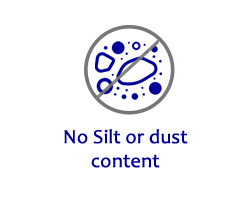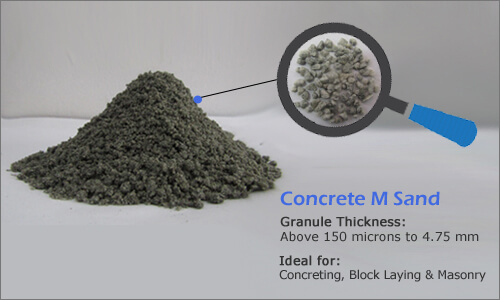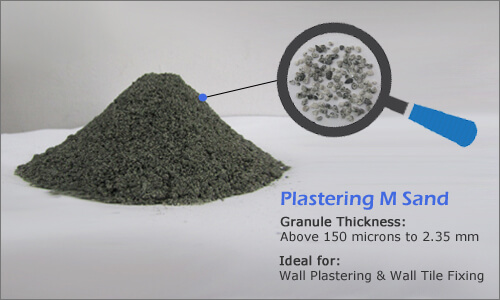Types of M Sand:
Advantages of M Sand





What is M Sand?
As the name suggests M-sand is produced or manufactured by crushing suitable rock boulders. These rock boulders is crushed under different stages to obtain desired granule size. M Sand contains very less amount of silt which makes them ideal for building construction.
What are the different types of sand available?
Three types of Msand are available in the market i.e.,
- Plastering M Sand: The sand manufactured here is of the granule thickness 150 microns to 2.35 mm and it is ideal for wall plastering, wall tile laying purposes.
- Concrete M Sand: The sand manufactured here is of the granule thickness 150 microns to 4.75 mm and it is ideal for RCC, Concreting purposes.
- Brick work M Sand: The granule thickness of this sand is 150 microns to 3.55 mm and as the name says, it is ideal for brick or block laying purpose.
How is M Sand better than River sand?
River sand is harmful to our ecology as the sand is mined from deep river beds which affects the aquatic life and also disrupts the flow of river. However m-sand is eco-friendly as it is manufactured by crushing naturally available rock boulders.
Even the Government of Karnataka as banned the illegal mining of river sand and encourages everyone to use m-sand for there construction.
M sand is manufactured particularly used for concreting, plastering & brick laying, and no sieving is required here, hence you can save both labor time and cost. However, this is not the case with river sand as you need to sieve them.
M sand produces zero wastage and cost 40-50% less than river sand. Thus making msand an economical alternative for river sand.



